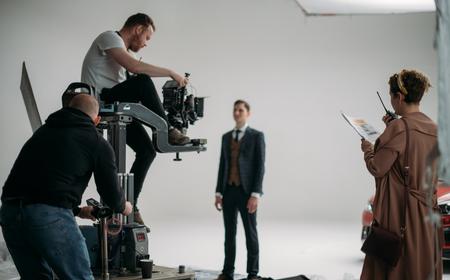
Self-tapes have the potential to be seen by casting directors, producers, directors, and network executives, so make sure yours is in the best shape possible. As casting director Howard Meltzer says, “The self-tape has to be good, if not better, than the actors we are seeing in the room.” Don’t undermine yourself with a sloppy self-taped audition. Here are 13 common mistakes actors make with self-tapes—and how to avoid them.
1. Shooting vertically.
All self-tapes should be shot horizontally, no exceptions.
2. Standing too far away.
Casting should be able to see your face, eyes, and expression. Don’t shoot too close or too far; get it just right and shoot from the waist up.
3. The full-body pan.
According to CD Carol Goldwasser, when casting asks for a full-body shot, they “don’t want to see a head and then a chest and then legs and then shoes”; instead, they “want the camera to get the entire person in the frame at one time.”
4. A distracting background.
Don’t record in front of a closet or in what’s a clearly recognizable room in your house. A self-tape should be filmed in front of a blank wall of neutral color, like green or blue. CDs want to be looking at you, not trying to figure out what’s hanging behind your head.
5. Poor lighting and sound.
Invest in a simple lighting kit. Add a mic to your phone or digital camera. Watch out for background noise from traffic, lawnmowers, and barking dogs.
6. Using a bad reader.
Pick a reader who’s a good actor with great diction. Even though you’re the one auditioning, their bad reading will bring the tape down. Make sure your reader stands to the immediate right or left of the camera. This will put your eyeline close to the camera lens—without you looking directly into it—so casting can see your expressions. And have your reader bring their volume down a bit to ensure they’re not talking over you.
7. Not dressing appropriately.
Wear solid, bright colors. Avoid white—it reflects too much. No hats, crazy makeup, excessive patterns, or flashy jewelry. Dress to suggest the character. You don’t need to buy a spacesuit if you’re reading for an astronaut, but you also shouldn’t be wearing shorts and a tank top for an office manager.
8. Yelling to express emotion.
Anger and sadness are more nuanced than just yelling. Find other dimensions to bring to a feeling. A coach can be very helpful here.
9. A bad stance.
Lowering your head to convey a feeling is OK, but don’t keep it down for too long. CDs need to see your eyes and emotions. Casting often views a move like this as bad acting, assuming you don’t know how else to demonstrate a feeling.
10. Fumbling with your script.
You should be off-book for a self-tape, but always have the script in hand just in case. It’s better to glance down to refresh your memory than fumble through lines. And please just hold the script still.
11. Letting the scene drift off.
Talent agent Robin Nassif says, “Don’t let the end of the scene just fade away. End the scene strong and on purpose. End your scene still in character. Don’t break character and say thank you, or suddenly pull the viewer out of the moment.”
12. Making lazy choices.
Make strong choices for your character. Do your homework and investigate how the character feels in that scene. Make bold choices that create a sense that something serious is at stake. Make your viewers care.
13. No editing.
If you’re taping two scenes, you need to be able to edit them together as seamlessly as possible. Learn how to use a video editing program, or hire a professional.
The following self-tape equipment will help if you’re ready to take your audition tapes to the next level:
- A softbox light kit or ring light
- A 60-inch tripod
- A tripod adaptor: If you’re recording with your phone, you’ll need to attach it to the tripod.
- A lavalier microphone: For sound, you should always use an external mic. Look for one that can hook up to any camera, including your phone.
- A neutral backdrop
Inspired? Check out our TV audition listings!
The views expressed in this article are solely that of the individual(s) providing them,
and do not necessarily reflect the opinions of Backstage or its staff.




















